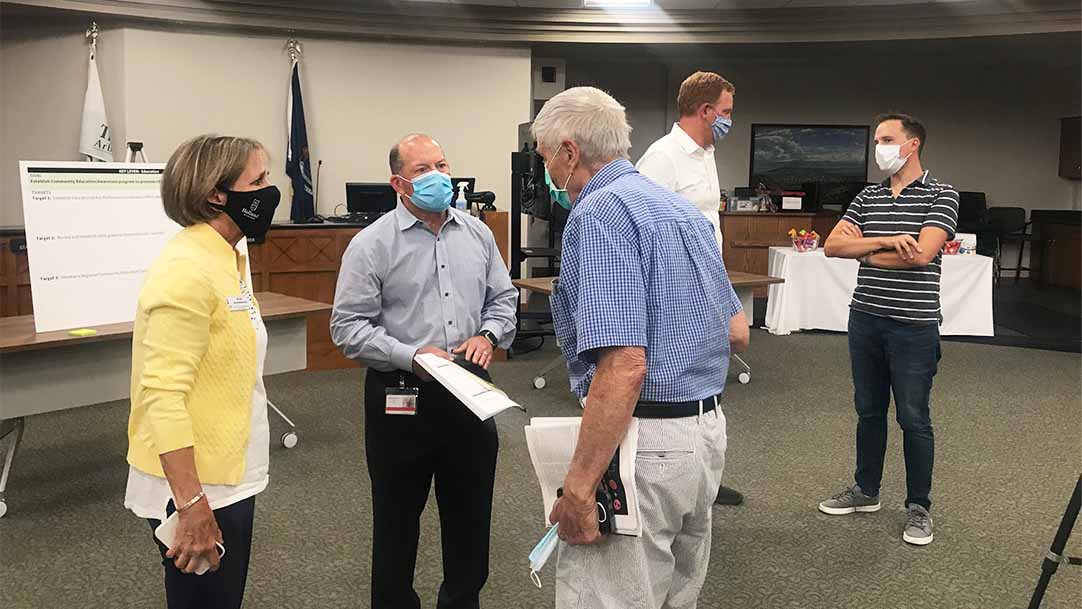 Local
Local
Community Energy Plan Refresh

Community Energy Plan Refresh
Holland’s Community Energy Plan (CEP) was developed in 2010, addressing potential strategies to establish Holland as an energy efficient city. The overarching goals of the CEP are to ensure economic competitiveness, to provide reliable and affordable energy, and to protect the environment. The CEP offers strategic directives that guide the community as a whole to ensure a healthy and viable energy future.
Every three to five years a work group named the Strategic Development Team (SDT) is appointed by the mayor and approved by City Council to review the CEP. The SDT recommends strategic initiatives and metrics to achieve CEP goals. The SDT is composed of community, higher education, Holland BPW, and City Council representatives.
Over the past year, the SDT held bi-weekly public meetings where they studied opportunities for energy efficiency, conservation, and technology improvements in order to make informed recommendations for the CEP. Additionally, a community comparison was done with the Outdoor Discovery Center to benchmark City of Holland’s performance and identify effective strategies. Focus communities, similar to Holland with exemplary performance in sustainability efforts, were analyzed. An internal review was also done that revealed indicators that make Holland unique.
The current recommendation strategy for the CEP review involves key levers that identify areas of focus. Each lever is defined with goals, targets and strategies that can help guide community actions and choices.
The Key Levers
Electric Portfolio
The electric portfolio refers to the sources of energy available to Holland Board of Public Works for electric distribution. While Holland Energy Park produces energy supply for the community, the electric utility also relies on multiple sources to ensure reliability and affordability.
Goal
- Continue to shift Holland electric portfolio with emission levels that align with current climate science and regulatory guidelines, while maintaining excellence in reliability and affordability.
Building Energy Consumption
Building energy consumption refers to energy used by and within buildings. For example, energy efficiency can be impacted by architecture design, materials, insulation, windows, lighting, and appliances.
Goal
- Reduce Carbon Emissions in the built environment.
Transportation
Transportation refers to all ways that constituents travel from one place to another. This includes personal vehicles, mass transit vehicles, municipal and utility vehicles, as well as pedestrian modes of transit.
Goal
- Reduce Carbon Emissions in the transportation sector.
Education
Education refers to exchanging information in ways that deepen the community’s understanding and awareness of the CEP goals and supportive programming.
Goal
- Establish Community Education/Awareness Program to promote CEP programs, performance, and goals.
Carbon Offsets
Carbon offsets refer to compensating for emissions by creating carbon storage elsewhere. For example, carbon offsets can be achieved by restoring wetlands or other land restoration and planting trees.
Goal
- Take a leadership role in the creation of a community-based system to provide businesses and residents access to carbon offsets to meet their individual goals and commitments, including the option of local carbon offset projects.
Key Lever Voting Results
The City of Holland and Holland BPW hosted a community feedback session at City Hall. Members of the SDT were present. City of Holland residents were invited to provide their thoughts about the proposed recommendations for the CEP. The SDT presented posters of the new key levers, goals, strategies and action steps. Community participants were encouraged to record their feedback on each key lever. Feedback was taken into consideration for the final recommendation presented to City Council.
The SDT voted unanimously on September 20, 2021 to forward its recommendations to City Council. City Council voted to accept the Strategic Development Team recommendations in October. The full details of the SDT work and its recommendations can be found here.